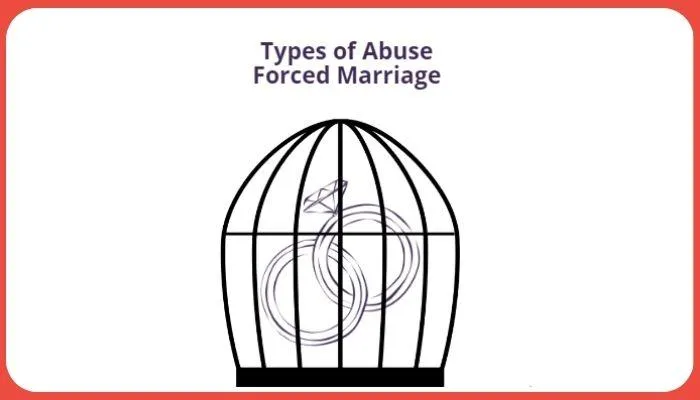Every child's well-being matters.
Types of Abuse Articles
Quick Access
Abuse of Authority
Abuse of Discretion
Abuse of Power
Behavioural Indications
Breast Ironing
County Lines
Cultural Differences (Physical Abuse)
Domestic Abuse
Economic Abuse
Emotional Signs
Exposure to Substance Abuse
Failure to Thrive
Female Genital Mutilation (FGM)
Forced Marriage
Hate Crimes & Targeted Harassment
Impact of Domestic Violence
Impact of Environment
Impact on Development
Institutional Abuse
Isolation
Modern Slavery
Neglect
Online Abuse
Parental Behaviours
Physical Abuse
Radicalisation
Religious Abuse
Restraint
Sexual Abuse
Types of Abuse
Witnessing Domestic Abuse

Safeguarding against Forced Marriage
Custom HTML/CSS/JAVASCRIPT
Forced marriage is a serious violation of human rights where one or both people are pressured into marriage without their free consent. This pressure can involve physical force, threats, or emotional manipulation, and it denies a person their basic right to choose. Early years practitioners, especially those in nurseries and preschools, have an important role in safeguarding children and families from this form of abuse.
Forced Marriage and Safeguarding
Forced marriage differs from arranged marriage. In an arranged marriage, both parties agree to the union. In a forced marriage, there is no true choice. Practitioners need to understand this distinction to protect vulnerable families and children from harm.
Key Aspects Practitioners Should Be Aware Of
1. Lack of Consent
In a forced marriage, consent is either missing or manipulated. This often involves threats or deception, meaning the person feels they have no real choice. For young children in certain communities, forced marriage may be an expectation they face as they grow older.
2. Types of Coercion
Physical Force: Some are forced into marriage through violence or threats.
Emotional Pressure: Family members may use guilt or threats to make a person agree.
Psychological Manipulation: This can involve isolating a person or convincing them they have no other options.
Early years practitioners are often trusted figures in a child's life, so they should be vigilant for signs that a family may be at risk of these coercive tactics.
Understanding the Impact on Women and Children
Forced marriage affects both men and women, but women and girls are more often impacted. Cultural or religious traditions can put significant pressure on families to uphold certain customs, often related to family honour. This makes young girls in these families particularly vulnerable. Practitioners should recognize cultural pressures but prioritise the safeguarding and welfare of each child.
Legal Obligations in Safeguarding
Many countries have laws that make forced marriage a crime. In the UK, forced marriage is illegal, and it’s recognised as a child protection issue. Nurseries and preschools have a duty to report any concerns they might have about forced marriage. If a practitioner suspects that a child or their family member is at risk, they should follow safeguarding policies and contact the appropriate authorities.
Signs and Consequences of Forced Marriage
Victims of forced marriage often suffer serious long-term consequences, including mental health issues, loss of educational opportunities, and social isolation. Practitioners should be alert to children who may show signs of anxiety, depression, or unusual family pressure. In some cases, families may remove children from education altogether to prepare them for marriage, which is a significant safeguarding concern.
What Practitioners Can Do
1. Be Observant
Watch for signs that a child or family may be at risk, such as frequent absences, sudden family trips, or changes in behaviour. Children from at-risk families may also speak about family expectations or pressures that seem out of place for their age.
2. Provide a Safe Space
Practitioners can make sure children feel safe and supported in the nursery or preschool setting. Staff should make it clear to children and families that their facility supports autonomy, choice, and protection from harm.
3. Follow Safeguarding Policies
If there are concerns, staff should follow established safeguarding procedures. Forced marriage is a serious safeguarding issue and should be reported to the designated safeguarding lead in the setting, who will take further action with local authorities.
4. Educate and Raise Awareness
Education and awareness are key in preventing forced marriage. By educating families about the rights of individuals and the importance of choice, practitioners help break harmful traditions and empower families.
Conclusion
Forced marriage violates the basic rights of individuals, and for children, it’s a significant safeguarding risk. Early years practitioners play a vital role in identifying and protecting children and families from this harm. With vigilance, education, and adherence to safeguarding policies, nursery and preschool staff can support vulnerable children and help create a safer, more inclusive community for everyone.
AUTHOR:- Iona has nearly 10 years of experience supporting nurseries and childminders in curriculum planning, leadership, and safeguarding. Her writing is informed by public information and sector insight, aiming to provide accessible, practical support for professionals working with children. She is part of the On the Button team, helping deliver Well-being, Safeguarding and Complaint Management Software that empowers practitioners to identify concerns early and act confidently.
On the Button provides innovative software tailored to the needs of the early years sector, with a strong focus on EYFS well-being and early years safeguarding. Our tools help senior practitioners to confidently track concerns, maintain robust records, and respond effectively — all while meeting statutory guidance. From early years complaint management to team-wide safeguarding alerts, our platform puts children's safety and emotional health first.
Quick Access
Abuse of Authority
Abuse of Discretion
Abuse of Power
Behavioural Indications
Breast Ironing
County Lines
Cultural Differences (Physical Abuse)
Domestic Abuse
Economic Abuse
Emotional Signs
Exposure to Substance Abuse
Failure to Thrive
Female Genital Mutilation (FGM)
Forced Marriage
Hate Crimes & Targeted Harassment
Impact of Domestic Violence
Impact of Environment
Impact on Development
Institutional Abuse
Isolation
Modern Slavery
Neglect
Online Abuse
Parental Behaviours
Physical Abuse
Radicalisation
Religious Abuse
Restraint
Sexual Abuse
Types of Abuse
Witnessing Domestic Abuse

Safeguarding against Forced Marriage
Custom HTML/CSS/JAVASCRIPT
Forced marriage is a serious violation of human rights where one or both people are pressured into marriage without their free consent. This pressure can involve physical force, threats, or emotional manipulation, and it denies a person their basic right to choose. Early years practitioners, especially those in nurseries and preschools, have an important role in safeguarding children and families from this form of abuse.
Forced Marriage and Safeguarding
Forced marriage differs from arranged marriage. In an arranged marriage, both parties agree to the union. In a forced marriage, there is no true choice. Practitioners need to understand this distinction to protect vulnerable families and children from harm.
Key Aspects Practitioners Should Be Aware Of
1. Lack of Consent
In a forced marriage, consent is either missing or manipulated. This often involves threats or deception, meaning the person feels they have no real choice. For young children in certain communities, forced marriage may be an expectation they face as they grow older.
2. Types of Coercion
Physical Force: Some are forced into marriage through violence or threats.
Emotional Pressure: Family members may use guilt or threats to make a person agree.
Psychological Manipulation: This can involve isolating a person or convincing them they have no other options.
Early years practitioners are often trusted figures in a child's life, so they should be vigilant for signs that a family may be at risk of these coercive tactics.
Understanding the Impact on Women and Children
Forced marriage affects both men and women, but women and girls are more often impacted. Cultural or religious traditions can put significant pressure on families to uphold certain customs, often related to family honour. This makes young girls in these families particularly vulnerable. Practitioners should recognize cultural pressures but prioritise the safeguarding and welfare of each child.
Legal Obligations in Safeguarding
Many countries have laws that make forced marriage a crime. In the UK, forced marriage is illegal, and it’s recognised as a child protection issue. Nurseries and preschools have a duty to report any concerns they might have about forced marriage. If a practitioner suspects that a child or their family member is at risk, they should follow safeguarding policies and contact the appropriate authorities.
Signs and Consequences of Forced Marriage
Victims of forced marriage often suffer serious long-term consequences, including mental health issues, loss of educational opportunities, and social isolation. Practitioners should be alert to children who may show signs of anxiety, depression, or unusual family pressure. In some cases, families may remove children from education altogether to prepare them for marriage, which is a significant safeguarding concern.
What Practitioners Can Do
1. Be Observant
Watch for signs that a child or family may be at risk, such as frequent absences, sudden family trips, or changes in behaviour. Children from at-risk families may also speak about family expectations or pressures that seem out of place for their age.
2. Provide a Safe Space
Practitioners can make sure children feel safe and supported in the nursery or preschool setting. Staff should make it clear to children and families that their facility supports autonomy, choice, and protection from harm.
3. Follow Safeguarding Policies
If there are concerns, staff should follow established safeguarding procedures. Forced marriage is a serious safeguarding issue and should be reported to the designated safeguarding lead in the setting, who will take further action with local authorities.
4. Educate and Raise Awareness
Education and awareness are key in preventing forced marriage. By educating families about the rights of individuals and the importance of choice, practitioners help break harmful traditions and empower families.
Conclusion
Forced marriage violates the basic rights of individuals, and for children, it’s a significant safeguarding risk. Early years practitioners play a vital role in identifying and protecting children and families from this harm. With vigilance, education, and adherence to safeguarding policies, nursery and preschool staff can support vulnerable children and help create a safer, more inclusive community for everyone.
AUTHOR:- Iona has nearly 10 years of experience supporting nurseries and childminders in curriculum planning, leadership, and safeguarding. Her writing is informed by public information and sector insight, aiming to provide accessible, practical support for professionals working with children. She is part of the On the Button team, helping deliver Well-being, Safeguarding and Complaint Management Software that empowers practitioners to identify concerns early and act confidently.
On the Button provides innovative software tailored to the needs of the early years sector, with a strong focus on EYFS well-being and early years safeguarding. Our tools help senior practitioners to confidently track concerns, maintain robust records, and respond effectively — all while meeting statutory guidance. From early years complaint management to team-wide safeguarding alerts, our platform puts children's safety and emotional health first.

Safeguarding against Forced Marriage
Custom HTML/CSS/JAVASCRIPT
Forced marriage is a serious violation of human rights where one or both people are pressured into marriage without their free consent. This pressure can involve physical force, threats, or emotional manipulation, and it denies a person their basic right to choose. Early years practitioners, especially those in nurseries and preschools, have an important role in safeguarding children and families from this form of abuse.
Forced Marriage and Safeguarding
Forced marriage differs from arranged marriage. In an arranged marriage, both parties agree to the union. In a forced marriage, there is no true choice. Practitioners need to understand this distinction to protect vulnerable families and children from harm.
Key Aspects Practitioners Should Be Aware Of
1. Lack of Consent
In a forced marriage, consent is either missing or manipulated. This often involves threats or deception, meaning the person feels they have no real choice. For young children in certain communities, forced marriage may be an expectation they face as they grow older.
2. Types of Coercion
Physical Force: Some are forced into marriage through violence or threats.
Emotional Pressure: Family members may use guilt or threats to make a person agree.
Psychological Manipulation: This can involve isolating a person or convincing them they have no other options.
Early years practitioners are often trusted figures in a child's life, so they should be vigilant for signs that a family may be at risk of these coercive tactics.
Understanding the Impact on Women and Children
Forced marriage affects both men and women, but women and girls are more often impacted. Cultural or religious traditions can put significant pressure on families to uphold certain customs, often related to family honour. This makes young girls in these families particularly vulnerable. Practitioners should recognize cultural pressures but prioritise the safeguarding and welfare of each child.
Legal Obligations in Safeguarding
Many countries have laws that make forced marriage a crime. In the UK, forced marriage is illegal, and it’s recognised as a child protection issue. Nurseries and preschools have a duty to report any concerns they might have about forced marriage. If a practitioner suspects that a child or their family member is at risk, they should follow safeguarding policies and contact the appropriate authorities.
Signs and Consequences of Forced Marriage
Victims of forced marriage often suffer serious long-term consequences, including mental health issues, loss of educational opportunities, and social isolation. Practitioners should be alert to children who may show signs of anxiety, depression, or unusual family pressure. In some cases, families may remove children from education altogether to prepare them for marriage, which is a significant safeguarding concern.
What Practitioners Can Do
1. Be Observant
Watch for signs that a child or family may be at risk, such as frequent absences, sudden family trips, or changes in behaviour. Children from at-risk families may also speak about family expectations or pressures that seem out of place for their age.
2. Provide a Safe Space
Practitioners can make sure children feel safe and supported in the nursery or preschool setting. Staff should make it clear to children and families that their facility supports autonomy, choice, and protection from harm.
3. Follow Safeguarding Policies
If there are concerns, staff should follow established safeguarding procedures. Forced marriage is a serious safeguarding issue and should be reported to the designated safeguarding lead in the setting, who will take further action with local authorities.
4. Educate and Raise Awareness
Education and awareness are key in preventing forced marriage. By educating families about the rights of individuals and the importance of choice, practitioners help break harmful traditions and empower families.
Conclusion
Forced marriage violates the basic rights of individuals, and for children, it’s a significant safeguarding risk. Early years practitioners play a vital role in identifying and protecting children and families from this harm. With vigilance, education, and adherence to safeguarding policies, nursery and preschool staff can support vulnerable children and help create a safer, more inclusive community for everyone.
AUTHOR:- Iona has nearly 10 years of experience supporting nurseries and childminders in curriculum planning, leadership, and safeguarding. Her writing is informed by public information and sector insight, aiming to provide accessible, practical support for professionals working with children. She is part of the On the Button team, helping deliver Well-being, Safeguarding and Complaint Management Software that empowers practitioners to identify concerns early and act confidently.
On the Button provides innovative software tailored to the needs of the early years sector, with a strong focus on EYFS well-being and early years safeguarding. Our tools help senior practitioners to confidently track concerns, maintain robust records, and respond effectively — all while meeting statutory guidance. From early years complaint management to team-wide safeguarding alerts, our platform puts children's safety and emotional health first.
Quality Early Years Ltd.,
Dickens House,
Guithavon Street,
Witham, Essex,
England, CM8 1BJ
© Quality Early Years Ltd 2025

Find On the Button
on Social Media

